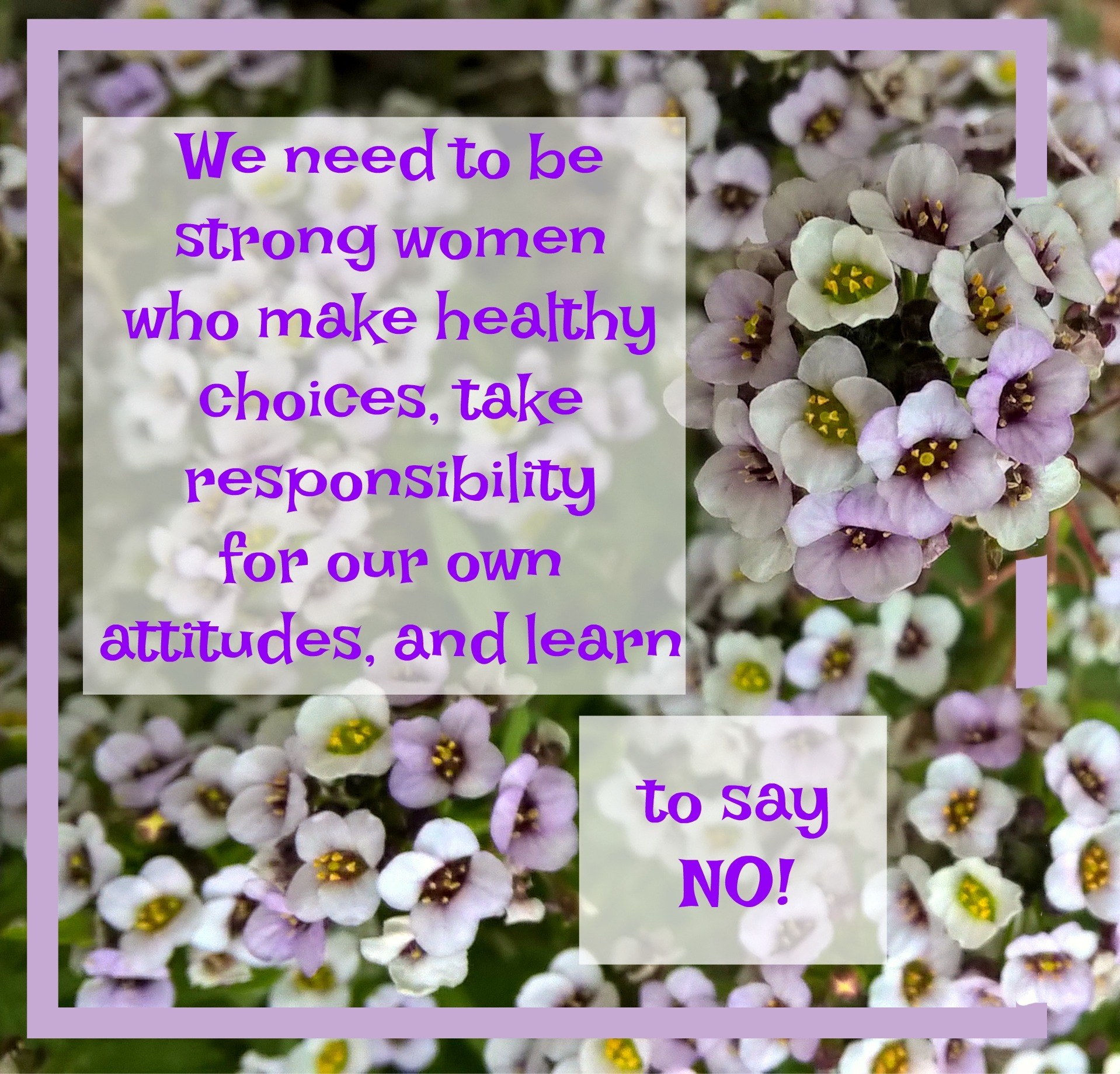


 We women can be focused driven work machines. We strive to accomplish more than possible, spin the gears nonstop until after the day is done, and are often multi-tasking like a pro.
We women can be focused driven work machines. We strive to accomplish more than possible, spin the gears nonstop until after the day is done, and are often multi-tasking like a pro.
We can change diapers with our eyes closed while planning a mental to-do list for the next 24 hours, cook dinner and give an oral spelling test at the same time, slam dunk a presentation at work and then transition to shuttling the kids to sports. Such is the skill of most women.
We are not born capable, multitasking, accomplish-all machines, but as time passes and we reach adulthood and acquire more responsibility, we hone and refine this hurry-and-accomplish-all-that-life-throws at us skill.
And this is a good thing.
But it can also be a not so good thing.
Because we women tend to overcommit ourselves, pile more on our plate than we can reasonably accomplish, carry around guilt and unreasonable expectations, and we have a hard time saying no.
We may run on guilt and “I should,” because what people think is often very important to us.
So why do we women run ourselves ragged trying to do it all, please all, and struggle with this fear to say no?
I have never seen an article aimed at men that explains why they need to quit overcommitting themselves. I have never heard men confess to each other that ‘no’ needs to be part of their vocabulary. Nor have I caught them complaining (or is it bragging) about how they are just so busy they can hardly catch their breath.
This struggle to say ‘yes’ to often, and ‘no’ to little, seems to be more of a struggle for women than men.
So, what motivates this fear we women have of saying no?

17 reasons women find it difficult to say no.
1. Our own expectations that we can and should be able to do everything. (We often have higher expectations for ourselves then others have for us.)
2. We didn’t hear other women saying no and setting healthy boundaries when we were growing up.
3. We grew up hearing that we could do it all.
4. We think saying ‘no’ is admitting defeat or is being weak. (And the last thing we want to be is weak.)
5. We are easily motivated by guilt. Our own and others. And this guilt to please others also doesn’t want to let others down or disappoint them, so we say yes. We think it is our job or responsibility. And as the years pass, we tend to pile more and more onto our job description.
6. We think no one else will do it. Or do it right. Or do it on time. Or do it the way it needs to be done. So, we do it.
7. We rationalize “what’s one more thing?’ One more child? One more meeting? One more committee?
8. We think we should do it because we have done it the last four years. Or is it ten years? Everyone is depending on us and we know how to do it right.
9. We want to be strong and capable, so we say yes and then yes again. We are after all, supper women. We think super women don’t need help and don’t ask for help.
10. We have this inner nature to nurture, take care of, and help, which of course is a very good thing. Unless we can’t say no and feel responsible for things that are not our responsibility.
11. Past or present shame motivates us. Maybe we were told by our mother, or someone else, we were not very helpful, and years later we are still trying to prove their words wrong.
12. People tell us we should do it, or expect us to do it. We don’t want to let them down.
13. We are good at doing something, and know we are good at doing it, and it is hard to say no because we know we will do a darn good job.
14. We have been doing it for years. Why stop now? And if we stop, who will do it? And if we stop people protest.
15. We feel everyone else’s needs come before ours. Or that they should if we are a good mother, wife, sister, daughter, employee . . ..
16. We feel we need to be busy. Our worth comes from how much we accomplish, and we feel important when we are busy. Busy is our new important.
17. Saying yes makes us feel good and keeps us from feeling our real emotions.
Although this is a rather lengthy list, there are still reasons not listed (please leave them in the comments if you think of any).

 The important thing to remember is that different things motivate us to say yes, and different circumstances or people bring forth different triggers (or emotions).
The important thing to remember is that different things motivate us to say yes, and different circumstances or people bring forth different triggers (or emotions).
One person may make us feel guilty, another person may play upon our need to nurture, while another situation may make us feel selfish if we say no.
The point is . . .
We have assorted reasons about why we say yes to often, and don’t say no enough. One reason will not cover all circumstances or people. This is also why it is easier to say no sometimes, and harder other times.
So, what’s the problem with all this?

What happens when we can’t say no enough?
When we say yes to often, and no not enough, we often fall into the martyr syndrome or the victim syndrome. Neither is very pretty or fun to live with.
What is the martyr syndrome?
A martyr does everything herself. She wants to appear as the only one good enough to do things right and silently looks for recognition and pats on the back for all her hard work and helping of others. She never asks for help (others would not do it correctly, or do it at all). When others don’t praise her efforts, or notice that she is biting off more than she can handle and step in and help her (but without her asking), she becomes bitter, resentful, sarcastic, and snippy. Guilt and shame are two of the tools she uses to make those around her feel bad for not helping her or appreciating her.
What is the victim syndrome?
A victim feels like she does it all (and often feels she doesn’t have a choice but to do it all). She feels that everyone takes her for granted and relies on her to much. She feels overworked and taken advantage of, but she won’t stand up and say no (or feels she can’t say no without consequences). Instead she tries to get others to feel remorseful for all her yes’s. She does this by serving a heaping dose of guilt and shame on those around her. Her goal is to make others feel sorry for her, while making them think she has no other choice but to continue doing what she is doing and sacrificing her happiness and time for them.
Like I said, neither the martyr or victim is pretty to live within close proximity to.
Remembering what’s important.
There is good news. Both the martyr and victim are roles we choose to play, or not play.
Like so much of life, we can choose to be a martyr or victim. And we can also bounce between the two roles depending on our audience and time of day. Or we can be strong women who learn to make healthy choices, take responsibility for our own attitudes (and not blame others or circumstances), and learn to say no.
We can model how to set healthy boundaries to our co-workers, sisters, daughters, friends, and mothers that respect our needs and the needs of those we help and serve, or we can become victims and martyrs and make those within close proximity run for cover from us.
We can take responsibility for our own choices, life, and attitudes, or we can blame others and be motivated by guilt and trying to please others.
We can try to be super women who have it all together, and are ever ready to help everyone but ourselves, or we can be honest, vulnerable, and tender with ourselves and others.
We can try and do it all on our own (and miserably fail), or we can show more strength by asking for help from others and our creator.
We can look for the approval of others, or the approval of God.
We can base our worth on our to-do list and accomplishments, or we can base our worth on being his child.
We can give our self grace, or beat our self up. The choice is ours.
What will you choose?
 Next week’s post – How and Why We Must Learn to Say No.
Next week’s post – How and Why We Must Learn to Say No.
Thanks for stopping by. Keep remembering what’s important.
Theresa
If you need some weekly encouragement and hope, tied up with some humor? Subscribe and join the journey. Life is sweeter when we walk alongside one another.
Join the discussion: What keeps you from saying no? (Mine are 1, 2, 5, 6, 9, and 14.)
 May link up at Jennifer Dukes Lee (#tellhisstory); and Holley Gerth (#coffeeforyourheart), Lori Schumaker (#Moments of Hope), Crystal Storms (#HeartEncouragement), Arabah Joy (#Grace & Truth).
May link up at Jennifer Dukes Lee (#tellhisstory); and Holley Gerth (#coffeeforyourheart), Lori Schumaker (#Moments of Hope), Crystal Storms (#HeartEncouragement), Arabah Joy (#Grace & Truth).

- How Knowing Your Husband Can Impact Him for Good - March 24, 2022
- How to Stop Focusing on What’s Wrong with You - March 9, 2022
- Is God Really Good All the Time? - February 24, 2022
It truly is so important to find the balance. Thanks for a thought provoking post. Thinking especially about this balance as a single woman with no children, etc. Blessed to be your neighbor at Coffee for your Heart this week.
Tara, Thanks for stopping by. I know when I was single, and before children, I wasn’t over committed. But I also wish I had learned to say no back then and not been so driven by wanting to please others and or guilt. There are so many good things we can say yes to, but we also need to learn to say no and not feel bad or guilty. Learning to say no is a handy tool at any age, but especiaslly as we get older and take on more responsibility. Blessings, neighbor.
“Everyone is depending on us” <— this! I mean, who doesn't want to be the 'go-to' girl, right? we like feeling necessary, and irreplaceable, but isn't that just really a stroke of our ego… pride, even? we don't need to cultivate the myth that everyone can depend on us, but point them to God who will truly never let them down. thanks!
Yes, so true, Karen. We are often doing it to stroke our ego and pride. Let us be dependable people who point others to Jesus, not to our accomplishments.
Wow I think all of those are true for me at different times. This is a personal reason for me, but my Mom never sat still, so I feel guilty when I sit with a book. I know it doesn’t make sense, but many reasons don’t.
Sarah: Your mom and my mom must have known each other. Because my mom never sat still either. She always had some knitting or crocheting or something in her hands. She couldn’t just watch TV or talk, she needed to also be busy doing something. So I know what you mean about feeling guilty. For years I never watched TV without some handiwork or task in my hand. Then one day my daughter, after I had asked for probably the tenth time in the movie, “what did she say?”, just looked at me and said, “Mom, if you are going to watch the movie, then watch the movie and pay attention.” It took awhile, but now I can actually sit and watch a movie and not feel guilty about not doing two things at a time. And funny thing, I actually remember the movie and I am not asking what just happened nearly as often. 🙂
Love this, Theresa. I resonate with pretty much all of them. I really love how you delineate the martyr and the victim. Doing it all is not all it’s cracked up to be. Peace wins.
Thanks, Christine. We are happier when we have realistic expectations and try not to do it all.
Super post, theresa and quite a thorough list. At 65 I’m trying to embrace the sanctified No in a gracious manner (did it today, in fact.) I am capable and I can multi-task but a full platter means some things fall off (like a sweet attitude) at times. We need to value our rest/space and our no’s for the sake of our youngers’ who are watching us.
I love it Sue, the “sanctified No,” which of course is gracious. Yes, we need to set a good example to those who are watching us. Thanks for stopping by.
# 1, 5, 6, 9, 10, 12, 13, Especially 15 and 16. Wow I need more work on saying No. Lol
I know that a lot of times I have said Yes because I thought I would be loved more, appreciated or noticed. It would make me feel valued. It would make me feel wanted.
Yes, I have played both the Martyr and the victim for many years. (Grew up with a shining example of both!) I now choose a different path. One of love. I love knowing I, me, I, DO have a choice. Thanks for the reminder.
Hey look, we share some of the same reasons. 🙂 Thanks for sharing, Bliss. Yes, wanting to be noticed, appreciated, valued, and wanted are all reasons we often say yes. But they often lead to disappointment and the martyr and victim role over time.
It feels good to have a choice. To lean to say no. I love that we can be learning and changing at any time in our life. Good for you — growing and changing for the better.
So much truth in this post, Theresa. I have learned to say no and experienced so much freedom from it. When I read the book Boundaries, I learned that Jesus himself told us to let our yes mean yes and our no mean no. If Jesus gives us permission to say no, we can live freely. Thank you for your wisdom and your gorgeous photos! Sharing on FB and Twitter.
Yes, Sarah, Jesus wants us to mean what we say. He even had to say no and send the crowds away or take time away from his disciples. When I realized that even he could not help everyone or do everything, it helped me realize I could not either and that I to must also say no.